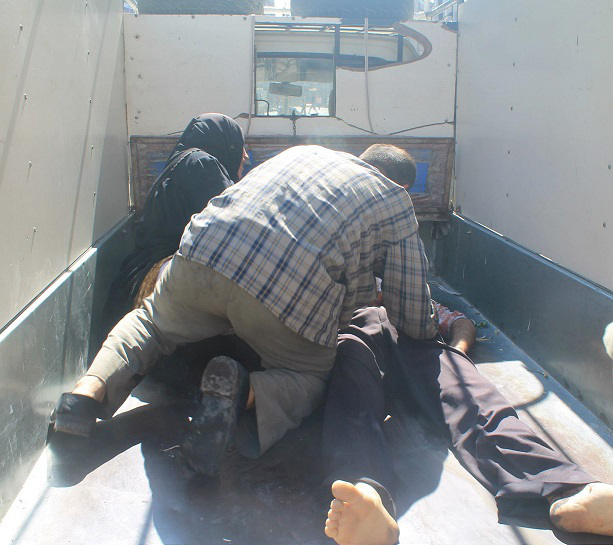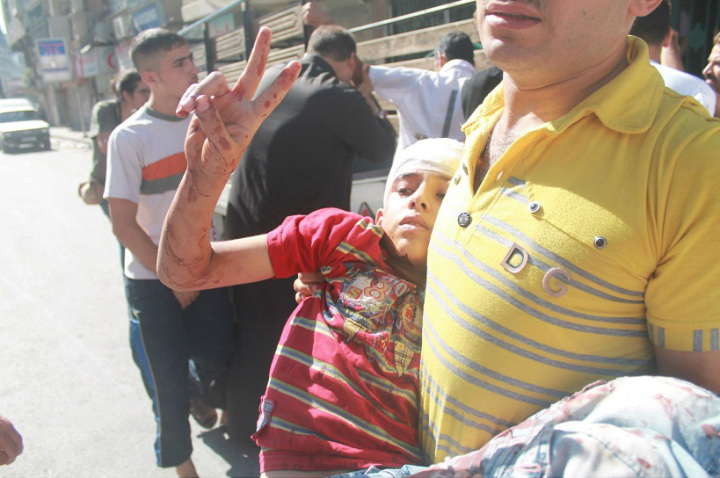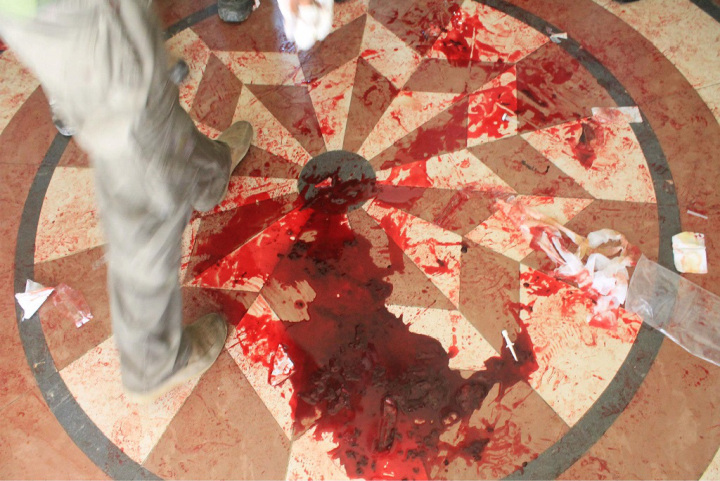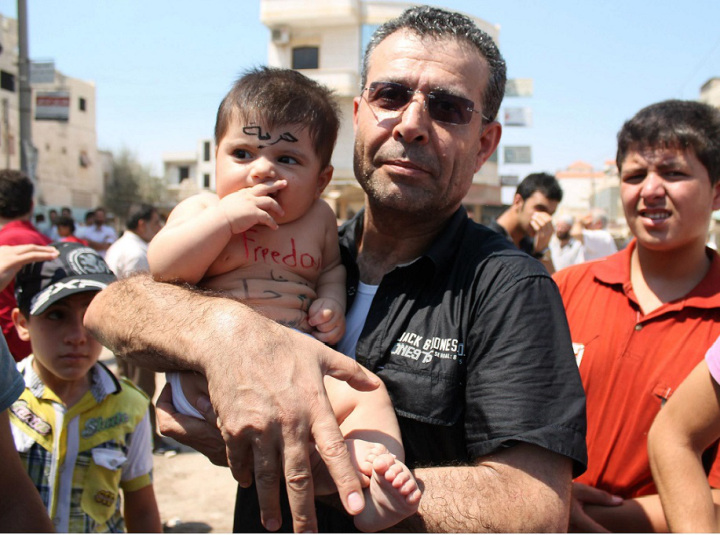‘That Father’. Aleppo, August 2012 – by Sunny Patel
I’m in a jeep with Carlos, a Reuters correspondent, and three other independent journalists. Our driver, a Free Syrian Army (FSA) commander, is zigzagging around Aleppo’s alleyways to avoid the gaze of the pilot circling directly above us. When the F15 finally disappeared in the distance, five minutes of sheer terror were replaced with a sudden calm. That made no difference as what would happen next ended up living with me forever.
 Aleppo, Syria – Parents distraught over their son’s death. He was one of many killed in a Assad regime airstrike on a bread line.
Aleppo, Syria – Parents distraught over their son’s death. He was one of many killed in a Assad regime airstrike on a bread line.
The date is August 10, 2012 and I’m in my worst nightmare.
The FSA Commander – who will remain unnamed – in the driver’s seat picked up his walkie-talkie after hearing mutterings over the transmitter. Once told what happened, the mortified commander spun the car around and, just like that, we were heading to a scene of utter carnage.
A bread line had been bombed by regime forces.
 Aleppo, Syria – One of many children injured or killed in the attack.
Aleppo, Syria – One of many children injured or killed in the attack.
We arrived at the scene 10 minutes later to the sounds of people in utter panic. Fathers carrying their bloodied and limbless children into a makeshift hospital. Women cradling their husbands’ heads in their laps as they bleed to a cruel death; and distraught children clambering over their parents’ lifeless bodies, unaware how their innocent world was about to become so brutal so quickly.
Outside the hospital – what was once clearly a hostel – were a pile of lifeless bodies of some 10-20 young Syrian men being prepared for their burial. Grown men collapsing in each others’ arms at the sight of their sons’ bodies being covered by the customary white cloth. They would never see their faces again. If that scene wasn’t mortifying enough, the image of a stream of blood being hosed out of the hospital was a telling tale of what further tragedy lay inside. I stepped inside with Carlos and the other journalists. There was not a spot of the hospital floor that was not covered with Syrian blood.
 Aleppo, Syria – Every inch of the makeshift hospital floor covered in the casualties’ blood
Aleppo, Syria – Every inch of the makeshift hospital floor covered in the casualties’ blood
People were being treated on floors with bare minimum medical supplies by paramedics on the verge of tears. Doctors and nurses screaming over each other for assistance. I saw the guilt in the eyes of medics who weren’t able to heed the calls of those injured who begged for help as they had to treat others first. Still, through the entrance behind me more people were being carried inside to the shouts of ‘Allahu Akbar’.
At first I thought I was feeling nauseous from the blood, but the nausea was from bearing witness to a colossal scale of pain. The orphaned children, the now childless parents, siblings torn apart and lovers no longer able to comfort one other. For the first time in the two weeks I was in Syria for, I was unable to pick up that SLR resting against my chest and start taking pictures – virtually paralyzed with all that lay before me.
There was a lasting memory that remained buried within me more than anything else I saw. As I walked around the hospital, I found a 40-something man huddled in a corner at the back. Nobody else had noticed him. There was a child on his lap. A girl, some three years old. He was talking to her so sweetly and with a big smile on his face. I didn’t understand a word of what he was saying, but I know the language of affection from a father to his own child when I see it.
His words were interrupted by a man who came to take his child away. The father refused to hand over the child, repeating the word ‘laa’ (no) several times. The man put his hand on the father’s shoulder and gently, with tears in his eyes, talked to him. When I heard him say the words ‘shaheed’ (martyr) and ‘bint’ (daughter) to the father, I connected the dots and realised that his daughter was dead. She died from a deep head wound caused by shrapnel. The man was going to take her away to bury her but the father refused to let go, scorning the man for even attempting to separate her from him. As his comforter conceded defeat to the father’s stubbornness and walked away distraught, the father placed her back on his lap, and carried on talking to his child.
What was he saying I wonder?
“When you wake up I will take you to buy some new toys”.
“I will get your favourite sweets and then sit with you to watch your favourite cartoons all day long on the tele”.
“I swear to you I will never tell you off again and get you everything you want.”
And then like a dam bursting, the tears gushed out of his eyes. With them came the wail so earth-shattering it could make even the hardened of us in tears. He yells at her like a mad man and violently shakes her to bring her back to life. I didn’t even try to console him. I selfishly watched him writhe away in his own pain.
And just like that, the storm within him stutters to a silence. He realised that his little precious daughter will not wake up again; nor would he be able to hear her sweet pestering voice calling him daddy; nor her smile or her laugh when he tickles her or when he pulls his funny faces; nor not being able to watch her throw another tantrum. He stares at her face gently stroking her cheeks while not even making a sound.
I placed my hand on his shoulder but he paid no notice. I walked away with my back turned towards him, but I could still hear his silence as I walked away. It was loud, overwhelming, crushing, and filled with a visceral anger, morphing into a shadow that would follow me forever.
It made my heart burn. That image and that moment changed me forever. I still till this day do not know his name. I remember him as ‘the father.’
I left Syria 2 days later, amidst further terrifying near-death moments where myself, Carlos and 4 other journalists alongside our taxi driver were almost blown to pieces by two F-16 missiles.
Me and Carlos illegally hopped over the Syria-Turkey border with the help of FSA rebels, and then proceeded to hitch-hike to Hatay. Within 48 hrs I was back in London. Back to safety – no war, no mass graves, no fighter jets, no barrel bombs, no grieving fathers, just the familiar cold arms of London. I felt embarrassed of the relief I felt the moment I was back home, the relief of escaping something so terrible that others don’t have the privilege of escaping.
I received a lot of petty criticism for the vice article I was published in, not that I care much for the critics, but I didn’t go to Syria to “thrill seek” as was suggested. It was to tell the stories of the countless fathers, mothers, men, women and children in Syria who are being victimised by Assad’s complex of torture and murder. It was to find out the truth for myself too.
Syria, has sparked an evolution in my politics, and with that it’s helped me to do away with some “friends” whom I once thought were on the right side of the global struggle for egalitarianism. People who I looked up to in the academic world were shunning the Syrians’ struggles and denying them the agency they needed. Every time I hear Robert Fisk, Chomsky, Cockburn, Hersh, Rania Khalek, Abunimah, and a host of supposedly reputable journalists replacing the reality of Aleppo and now Idlib, with a narrative that endorses an Israeli-American conspiracy for hegemony, all I see is the father’s face still in that hospital five years later, still cradling his dead daughter with these charlatans kicking him in the chest.
I too must admit, that prior to going to Syria, my beliefs were pretty linear to those today who see what’s happening in Syria as a western-begotten scheme; a modern day proxy Vietnam war between the US and a resurgent Putin’s Russia. An orientalist attitude – which I am deeply ashamed of – which rendered Syrian voices irrelevant, unless they agreed with my perceptions of what was happening in Syria.
Today, I meet a lot of people who hold this attitude, and are often quite aggressive in their delusions that either Assad is the necessary evil amidst a “sea” of “jihadists” he is opposing, or that his crimes are over-bloated by the “establishment” media. I certainly hadn’t been so ferociously similar to such delusional stances but I wasn’t that far off.
Despite being so revolted by the hypocrisy, the racist ‘war on terror’ rhetoric now adopted by these so-called “leftists”, and the constant brushing away of the regime and collaborators’ crimes with throat-clearing pre-ambles like “Yeah they’re bad but..”, I can still understand where this fervent anti-western imperialist sentiment stems from. Iraq, Afghanistan, Palestine. I don’t have to spell out the rest.
But it is inexcusable to ignore and absolve the crimes of other state actors. Speaking out for the victims of western sponsored crimes in Afghanistan, Iraq, Gaza, Nicaragua, or even the structural racism against POC in the states – doesn’t make you friends of the brown and the black folk. Speaking out and supporting every struggle against any tyranny is.
That means acknowledging that it was Saddam expunging the Kurdish population; that it was Gaddafi who was tormenting his people and torturing people in his prisons; that its Robert Mugabe who is to blame for his own menace; that Sisi is no different than Hosni Mubarak; that Saudi Arabia does not have the only Islamofascist regime in the world – Iran is an equal competitor; it means understanding that Putin’s Russia has scant regard for democracy and has a reputation for assassinating journalists and thwarting political opponents to preserve the autocratic regime: and it means listening to the people of Syria whose 40+ years of humiliation at the hands of the Assad dynasty brought them to the streets in 2011.
The massacre in Ghouta; the starvation siege of Madaya and Yarmouk; the relentless bombings of hospitals, schools, humanitarian convoys; the hundred of thousands dead and displaced and the languishing prisoners are all on Assad’s as well as Putin’s shoulders. Accepting that stance is a show of Solidarity with the Syrians. A denial of this is nothing short of a betrayal of your own anti-xenophobic stances. You can spew your visceral hatred for Trump, Farage, Le Pen, Gert Wilders or other far-right “populists” – whom I prefer to call racists – all you want, but an abandonment of the Syrian people using the age-old adage of “it’s all America’s doing” and absolving the crimes of such people puts you in cahoots with these very same bigots.
 Binnish, Idlib – Father holds child aloft during demonstrations against Assad regime after Friday prayers.
Binnish, Idlib – Father holds child aloft during demonstrations against Assad regime after Friday prayers.
The Syrian Arab Spring is taking its last stand in Idlib. The bombardment still continue. People like Eva Bartlett, Vanessa Beeley, Max Blumenthal, Ben Norton and Rania Khalek continue to do Assad’s bidding – whitewashing every one of his crimes having never set foot in the besieged parts of Aleppo – and people believe their lies. Meanwhile, Syrian activists on the ground, the White Helmets, and even children like Bana Al Abed who have lived through carnage for 6 years end up being shamefully trolled on social media. But people choose to listen to pseudo-journalists who are personally invited by the regime to their conferences and to their farcical war tours in “liberated” Aleppo, and dictate to us what’s happening from their ivory towers, demanding that we agree or we will be cast out as some ‘Al-Qaeda sympathisers’.
If you can in any way, forge an image in your mind of that father huddling in the back of the hospital sweetly begging his child to come back to life; if you can imagine the pain of a father seeing his own child die in his arms; if you can imagine that refusal to believe that his daughter was dead and violently shaking his daughter in an act of desperation to bring her back. If you can somehow imagine the feeling of listening to the haunting silence as he stared with a bludgeoned heart at his lifeless daughter, and you walking away with your back turned toward him knowing that this injustice, this cruelty will follow you everywhere you go; you will stand with the Syrians of Idlib and take a stand against Assad and Putin and their useful bigoted journalists.
If the Syrian struggle is allowed to fail without so much as even a whimper from you, then the memory of the father will haunt you as much as it does for me.